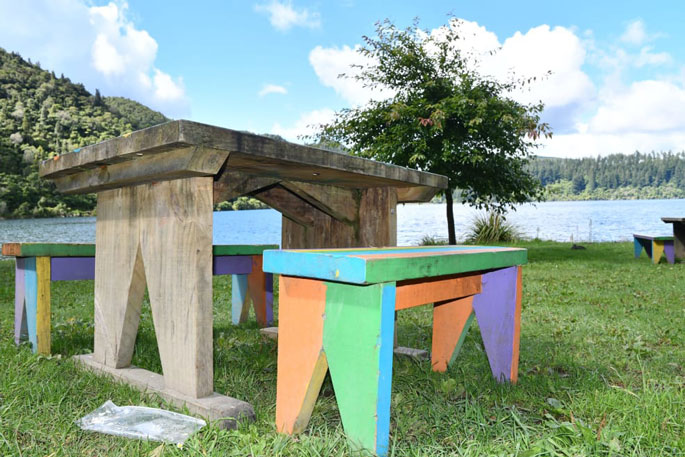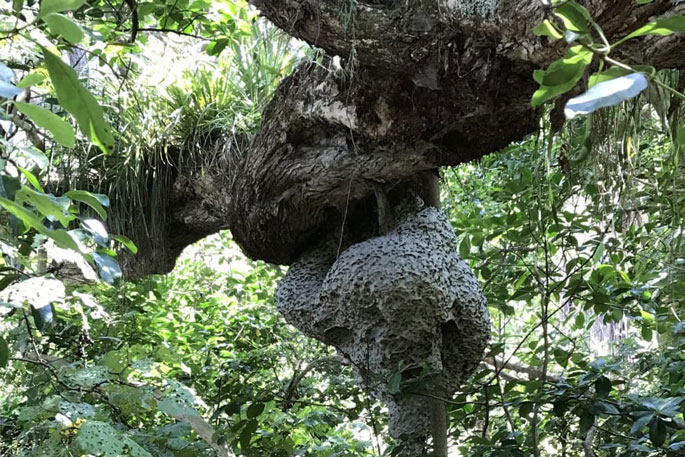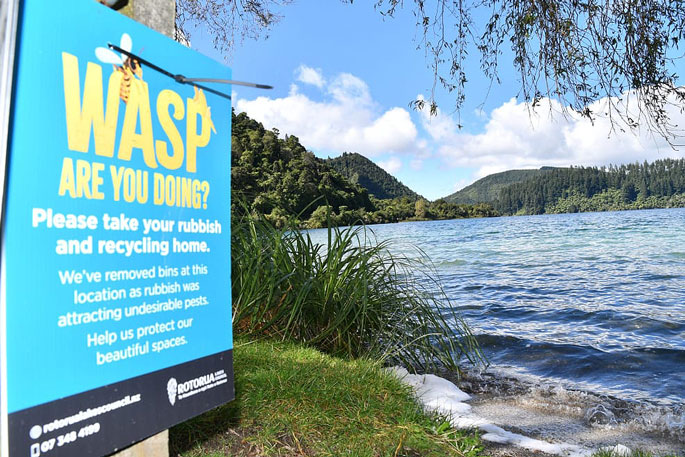A Rotorua woman has been left "disgusted" after walking more than 5km with her dog's poo after the council removed its bins from a popular lake.
The bins have been removed from Blue Lake (Tikitapu) on a winter trial, because the rubbish was attracting wasps.
Rotorua Lakes Council removed seven wasp nests from the area last week.
The council says other areas in the district without bins have had no issues with rubbish and it would look at other options if the trial was unsuccessful.
In a public statement, waste and climate change manager Craig Goodwin says they hope people will take their rubbish with them.
But some in the community have doubts that will happen.
Rotorua business owner Natalie Gracie walks her two dogs around Blue Lake daily but says she was disgusted to discover the bins were removed.
She had to walk more than 5km carrying dog poo.
Natalie says she has not seen wasps in the area before but believes if there was a problem, the "always full" state of the bins would have contributed.
She says people already use the area as a dumping ground and believes it will only get worse.
"I can walk past and there will be s*** from here to Africa."
She has previously seen things like nappies and condoms and it's not a good look with tourists coming to the area.
In her view: "No one is going to want to go there now ... it's going to be a s***hole."
Natalie says while some people like her will take the rubbish away, many will just dump it causing a safety and hygiene issue.
Blue Lake Top 10 Holiday Park manager Kelsi Hira says they have not been consulted with about the trial.
She calls the trial a band aid solution that will lead to littering.
Kelsi says they have previously held working bees to address an existing rubbish issue.
People leaving online reviews have, in the past, linked a scruffy Blue Lake to the camp.
She fears rubbish will end up in the grass or lake as visitors use facilities like the community barbecue.
With no bins in the public stretch of lakefront, Kelsi says the business will have to deal with increased amounts of rubbish being dropped into the holiday park bins.
She says there's a big wasp problem this year and the holiday park manages its wasp populations by maintaining 130 bait traps.
Local Democracy Reporting asked the council for a response to both Natalie and Kelsi's concerns, as well as questions about the trial and wasp issues.
Craig says the amount of litter collected from the bins was seasonal, so the trial will go through the winter and the area will be monitored.
"If the bin removal does not assist with wasp management, or there are issues with rubbish, we will look at other options."
Other areas in the district with no bins have no issues with rubbish, he says, such as at Te Pūtake o Tawa where hundreds of visitors pass through each week.
"This area is always kept tidy by our community and manuhiri (guests) and businesses there that generate waste from their products provide bins."
The bins at Blue Lake were emptied twice a week before their removal and Craig says food waste odours in empty bins continue to attract wasps and other pests.
He says tourists have rubbish disposal at their accommodation sites and facilities for mobile homes.
 Rotorua Lakes Council's waste and climate change manager Craig Goodwin said food waste in empty bins attracted wasps and other pests. Photo: LDR / Laura Smith.
Rotorua Lakes Council's waste and climate change manager Craig Goodwin said food waste in empty bins attracted wasps and other pests. Photo: LDR / Laura Smith."Like many other areas around New Zealand, the removal of bins in popular reserves is becoming more common."
In response to concerns about litter already at Blue Lake, he says illegal dumping is cleared from council-managed reserves as quickly as possible and the lake has not shown up as a problem area.
Six people have notified the council of wasps in the area since December 1, and it has received feedback from event organisers and user groups.
"In one case, St John were on hand for an event and tended to a number of stings that were considered serious in nature, according to the person who reported it."
The wasp removal cost council $1100. There will be follow-up management in October.
"This does not guarantee elimination of all wasps and we will follow up again next summer."
When asked to explain the decision-making process regarding the removal of the bins, potential increase in litter and whether this will cost more or less than the removal of wasps, he says it surveyed seven public recycling bins and found 97.5 per cent was contaminated waste.
"While the bins are meant to serve as a reminder to the public to separate waste and recycling, they have not to date proved to be effective."
If the trial works, a more comprehensive plan will be put together to identify where the approach could be taken, he says.
"Then we will be talking with local iwi and the community before we propose any long-term changes in our litter control programme."
Rotorua-based Proactive Pest Solutions work across the region and owner-operator Rhianon Mitchell says it has been a strange season.
Wet weather meant wasps found it tricky to establish themselves, but where they have, they had done well.
The last month has been busy with callouts to roof spaces and lakeside properties.
"They all came out with a vengeance."
She says the best method of dealing with wasps is to bait for the queens in spring.
Mitchell says during the summer wasps look for sugar, but as it gets cooler they look for proteins, and that's why they might be attracted to bins as people tossed their scraps.
How other Bay of Plenty councils manage their wasps
 A large German wasp nest discovered at Pohutukawa Park, Waihī Beach in 2021. Photo: LDR / Supplied.
A large German wasp nest discovered at Pohutukawa Park, Waihī Beach in 2021. Photo: LDR / Supplied.Local Democracy Reporting asked the six other councils in the region about their wasp control processes.
The council paid between $1500 and $2000 a year for wasp removal.
There has been one report of wasps this summer, five in 2022 and three in 2021.
It paid less than $1000 in 2022 and less than $500 in 2021 for wasp removal.
As a zero-waste district, it encourages people to be responsible for their waste and there were few public rubbish bins.
Bay of Plenty Regional Council biosecurity team leader Shane Grayling says German, Asian, Australian and common wasps are listed as advisory pests in the Bay of Plenty Regional Pest Management Plan 2020 - 2030.
The council doesn't enforce the control of advisory species on either public or private land and landowners or occupiers were responsible for managing them.
The council may provide advice on how to manage or control them if required.
- Western Bay of Plenty District Council reserves and facilities manager Peter Watson said it contracted a professional pest controller to remove or destroy wasp nests, placed bins away from seating areas to not affect reserve users and emptied and cleaned bins regularly to ensure there was no fermenting food to attract wasps.
- Kawerau District Council relied on the public and outdoor staff to report wasp issues and reported nests were immediately investigated, cordoned off and removed or treated by private pest controllers.
- Ōpōtiki District Council planning and regulatory group manager Gerard McCormack said it dealt with wasp nests on a case-by-case basis, mostly removing them from council buildings or reserves.
- Tauranga City Council and Whakatāne District Council were also approached for comment.
-Local Democracy Reporting is Public Interest Journalism funded through NZ On Air.




2 comments
Good on them!
Posted on 23-03-2023 11:40 | By Bruja
Put on your 'adult panties' and carry your rubbish (including dog poo) home. Too many waa waas in this country!
Better person than me.....
Posted on 23-03-2023 14:44 | By The Professor
If there were no bins for me to dump (:-)) my dogs crap in, I'd leave it on the ground.
Leave a Comment
You must be logged in to make a comment.